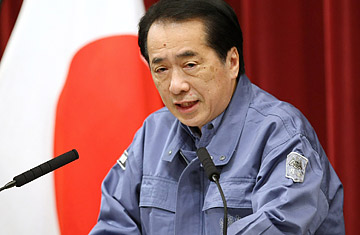
Japan's Prime Minister Naoto Kan speaks at a press conference in Tokyo on March 13, 2011, days after the country was hit by a devastating earthquake
When Naoto Kan, the Prime Minister of Japan, spoke to the nation on March 13, he did not mince words. In the aftermath of the earthquake and tsunami, Japan, Kan said, was facing its worst crisis since 1945, when the country was in smoking ruins. He reminded his listeners that they had overcome great challenges in the past, appealed to their sense of national unity and implored them to come together to rebuild Japan once again.
In a narrow sense, Japan — a rich nation with enormous resources of technology, social cohesion and an indefinable can-do spirit — surely will rebuild. The broader question is whether the exercise will compel its political establishment to face up to social and economic issues that, though well known since the bursting of the bubble economy a full 20 years ago, have a habit of being dodged — and whether Kan, 64, will be around to lead the charge.
Kan is head of the Democratic Party of Japan (DPJ), which took office under Prime Minister Yukio Hatoyama in 2009, sweeping the Liberal Democratic Party (LDP), which has long dominated politics in Japan, from power. Hatoyama resigned a year later and Kan — a veteran opposition politician and activist who had been Finance Minister — took over. Almost immediately, he faced a challenge to his leadership from Ichiro Ozawa, the "shadow shogun" of opposition politics in Japan, and in effect the founder of the DPJ. Though Kan fended off Ozawa, the usual Japanese accusations of money politics — in particular that Kan improperly accepted campaign contributions from foreign nationals — have dogged him and his administration. His Foreign Minister has resigned, and Kan himself is under pressure to do so.
Modern Japan can occasionally look as if Prime Ministers are as disposable as a toothbrush. Kan is the fifth to hold the office since the LDP's Junichiro Koizumi resigned in 2006, after five years (an unusually long spell) in office. But Kan has certainly made the right noises, consistently stressing the need for Japan to engage in a new phase of opening itself to the outside world, as it did after the Meiji Restoration in the 19th century and again after the end of World War II. He's spoken of his desire to expand trade links with the E.U., perhaps through a free-trade area, and is expected to say this summer if Japan intends to join the Trans-Pacific Partnership, a nascent grouping that may one day link the U.S. to Asian nations in another huge free-trade pact.
At the World Economic Forum annual meeting in Davos, Switzerland, this year, in a well-regarded speech, Kan stressed the need for opening and reform. And he impressed participants who met him with his willingness to engage with all the taboos of modern Japanese politics — the challenges facing one of the world's most rapidly aging societies, the fact that it is not open enough to immigrants, the way its economy places barriers in the way of women who want to return to the workforce.
The task facing Japan, however, is less to list the challenges it faces — Kan is hardly alone in being able to do that — and more to do something about them. Japan is a successful, technologically advanced society with a history of innovation and creativity and has provided its people with prosperous and secure lives. But its political establishment — a combination of politicians, traditional interest groups like rice farmers, a permanent bureaucracy that has traditionally been closely allied to the LDP and a press in which long-established media companies hold sway — has been unable to marshal Japan's resources so as to face the future with confidence. For a society that at its best used to be keen on discovering what the rest of the world could offer, Japan of late has seemed curiously inward looking, with its young men somehow less interested in learning from others than those elsewhere in Asia. The number of Japanese studying in the U.S., for example, has fallen in the past 10 years. Kan at least gives the impression — perhaps more than any political leader since Koizumi — of understanding the nature of Japan's shortcomings and what must be done to overcome them. Given the need to concentrate on the enormous task of rebuilding, this may not be the most sensible time to look for a new leader. It is certainly the time for Kan to prove he's the right one.
